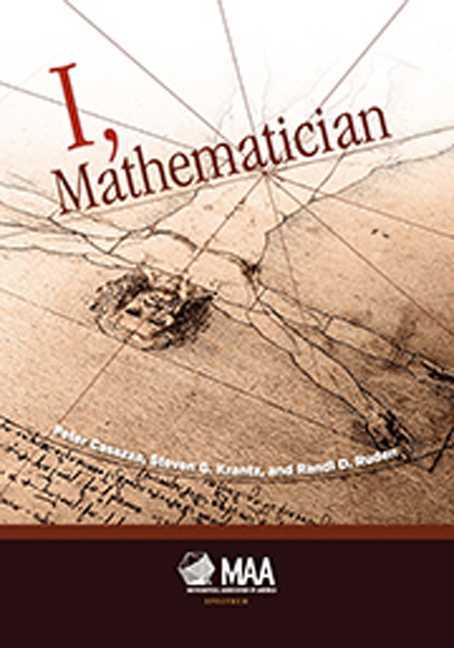Book contents
- Frontmatter
- Contents
- Preface
- Part 1 Who Are Mathematicians?
- Part II On Becoming a Mathematician
- Foreword to On Becoming a Mathematician
- 11 Mathematics and Teaching
- 12 Who We Are and How We Got That Way?
- 13 Social Class and Mathematical Values in the USA
- 14 The Badly Taught High School Calculus Lesson and the Mathematical Journey It Led Me To
- 15 The Psychology of Being a Mathematician
- 16 Dynamics of Mathematical Groups
- 17 Mathematics, Art, Civilization
- 18 Questions about Mathematics
- 19 A Woman Mathematician's Journey
- Part III Why I Became a Mathematician
16 - Dynamics of Mathematical Groups
from Part II - On Becoming a Mathematician
- Frontmatter
- Contents
- Preface
- Part 1 Who Are Mathematicians?
- Part II On Becoming a Mathematician
- Foreword to On Becoming a Mathematician
- 11 Mathematics and Teaching
- 12 Who We Are and How We Got That Way?
- 13 Social Class and Mathematical Values in the USA
- 14 The Badly Taught High School Calculus Lesson and the Mathematical Journey It Led Me To
- 15 The Psychology of Being a Mathematician
- 16 Dynamics of Mathematical Groups
- 17 Mathematics, Art, Civilization
- 18 Questions about Mathematics
- 19 A Woman Mathematician's Journey
- Part III Why I Became a Mathematician
Summary
What is a mathematician? Not who, but what. Are there axioms or is there a lemma whose hypotheses, if satisfied, allow you to conclude “then you are a mathematician”? Clearly not. Regardless there are some conjectural characteristics that come to mind. Most of us majored in math, and in doing so decided before the age of 20 that we wanted to study math. At some point most of us studied math to the exclusion of all but closely allied subjects. However this is a fairly modern definition; the history of mathematics and mathematicians is much sloppier than that and filled with fortuitous events that led to mathematical discoveries we take for granted today. Nicole Oresme was a Catholic bishop in France in the 1300s during a time when astrologers were members of the intelligentsia; he also held the title of Secretary of the King and wrote popular articles about science by translating Aristotle's work into French. At that time courts often kept on hand astrologers to help predict significant events, but Oresme was strongly against the acceptance of astrology as a science. Philosopher, priest, mathematician and all-around scientist, Oresme used probabilistic arguments in his analysis of nature, long before probability existed. This led to the following admission that he wrote more than once: ”… (except for the knowledge of true faith) …. I indeed know nothing except that I know that I know nothing.” He also came up with the earliest notion of graphs appearing in Tractatus de latitudinibus formarum and shown in Figure 1, which plot velocity against time of a moving object. Three hundred years later, Pascal gave the formal mathematical underpinnings of probability theory in order to solve a problem of how to calculate odds correctly when a gambling game is interrupted.
So early mathematicians were not focussing exclusively on mathematics. Oresme's motivation for working out properties of irrational rotations on the circle is well-documented, and brings to mind this hummable song from the late 1960s musical Hair:
When the moon is in the Seventh House
And Jupiter aligns with Mars
Then peace will guide the planets
And love will steer the stars
Indeed, Oresme developed the notion of incommensurability of rotations of the circle, irrational rotations, and specifically discussed their aperiodic orbits in order to debunk the ideas of astrology.
Information
- Type
- Chapter
- Information
- I, Mathematician , pp. 192 - 202Publisher: Mathematical Association of AmericaPrint publication year: 2015
